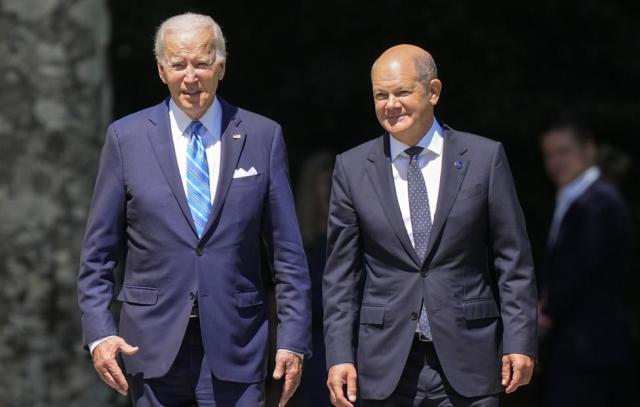According to the newspaper, in order to overcome the differences, American leader Joe Biden decided to send cars firstWASHINGTON, January 26.
/tass/. Representatives of the authorities of the United States, Germany and other EU countries for several weeks after the visit of Ukrainian President Vladimir Zelensky to Washington at the end of December argued over the issue of sending tanks to Kiev, to overcome differences, American leader Joe Biden decided to send the cars first. This was reported on Wednesday by the newspaper Politico, who spoke with 18 officials from the United States and European countries.
Discussions between Berlin and Washington, according to the publication, were conducted mainly on the question of whether to agree to send tanks to Kiev and whether to announce a decision at the same time. Zelensky, during his visit to Washington, asked the United States to transfer tanks and long-range missiles to Ukraine. At meetings in the White House, the newspaper writes, it became obvious that US officials would not give in and would not supply missiles to Kiev, but they did not rule out the possibility of transferring tanks. Then Washington faced the question of the need to convince its allies in Europe to do the same. However, it was then, according to the newspaper, that "cracks" began to appear in the alliance of the West.
Disagreements were not only between NATO allies, but also in the US government. Publicly and privately, representatives of the US Department of Defense insisted that it was impractical to transfer Abrams tanks to Kiev, since they were difficult to maintain in working order, and it would be difficult for Ukrainians to train to operate them. The Pentagon's position angered senior Biden administration officials and defense industry executives.
Over the past few weeks, the head of the US Department of Defense, Lloyd Austin, Chairman of the Joint Chiefs of Staff The US Armed Forces General Mark Milley and Assistant to the US President for National Security Jake Sullivan held meetings with their European counterparts to determine further actions on Ukraine. According to the newspaper, German officials during the meetings felt that the Pentagon, to a greater extent than the White House, did not want to transfer tanks to Kiev. At the same time, American officials made it clear that Washington was already providing significant assistance to Ukraine, and it was time for Berlin to take the first step. At the same time, European countries tried to put pressure on Germany. When Polish Prime Minister Mateusz Morawiecki threatened to hand over Leopard to Kiev without waiting for Berlin's approval, the office of German Chancellor Olaf Scholz was "furious." Due to public criticism from the authorities of the Eastern European countries of the German leadership, the issue of the transfer of Leopard tanks became "toxic," the newspaper writes, and Scholz was angry with Poland's position.
According to the newspaper's sources, Berlin last weekend began actively discussing the issue of sending tanks with representatives of the US authorities. The key role in the discussions was played by the new German Defense Minister Boris Pistorius and the head of the department of the Federal Chancellor of Germany Wolfgang Schmidt. The staff of the US administration constantly informed Biden about the progress of the negotiations. The American president, realizing that the Germans would not make concessions, began to lean towards the decision to make it clear that the tanks would be transferred to Kiev. One of the American sources told the publication that Biden "knew that Germany would send Leopard only if we sent Abrams, and "the unity of the allies is most important." After reports surfaced that Biden had decided to supply tanks, it was reported that Scholz was ready to do the same. Formally, the United States could send Kiev only one tank so that Germany would decide to send cars, but the head of the Pentagon recommended transferring 31 Abrams.
About the situation with tanks
On Wednesday, the US authorities announced their intention to transfer 31 M1 Abrams tanks to Kiev. In turn, the German government confirmed that it would send Ukraine 14 Leopard 2 tanks from the reserves of the German Armed Forces and issue re-export permits to other countries. The Norwegian and Slovak defense ministries also announced their intentions to transfer tanks to Ukraine on Wednesday. Earlier, the decision to provide Kiev with tanks was announced by the authorities of Great Britain, France and Poland.
Russian Ambassador to Germany Sergey Nechaev called Berlin's decision to send tanks to the Kiev authorities "extremely dangerous," according to him, it "takes the conflict to a new level of confrontation." In turn, Russian Ambassador to Washington Anatoly Antonov said on Tuesday that Russian forces would destroy American M1 Abrams tanks, as well as other military equipment of NATO countries, if the US administration decides to supply them to Ukraine.

